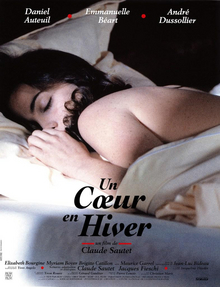A Heart in Winter (French: Un cœur en hiver) is a 1992 French romantic drama film co-written and directed by Claude Sautet. It stars Daniel Auteuil, Emmanuelle Béart and André Dussollier. It was chosen to compete at the 49th Venice International Film Festival,[2] where it won four awards, tying for the Silver Lion. It was nominated for Best Film Not in the English Language at the 47th British Academy Film Awards.
| A Heart in Winter | |
|---|---|
 Theatrical release poster | |
| French | Un cœur en hiver |
| Directed by | Claude Sautet |
| Written by |
|
| Produced by | Philippe Carcassonne |
| Starring | |
| Cinematography | Yves Angelo |
| Edited by | Jacqueline Thiédot |
| Music by | Maurice Ravel |
Production companies |
|
| Distributed by | AFMD |
Release date |
|
Running time | 105 minutes |
| Country | France |
| Language | French |
| Box office | $11.7 million[1] |
It was the second-to-last film by Sautet. He reunited with Béart on his final feature, 1995's Nelly and Mr. Arnaud.
Synopsis
editHighly regarded violin restorer Stéphane works and plays squash with his longtime business partner Maxime. After Maxime, who is married, begins a relationship with concert violinist Camille, Stéphane is called in to do some urgent repairs on Camille's violin. Camille begins to fall for Stéphane, and reveals the truth to Maxime. Stéphane's cool reaction causes confusion for Camille, and she lashes out at him for denying his feelings.[3]
Cast
edit- Emmanuelle Béart as Camille
- Daniel Auteuil as Stéphane
- André Dussollier as Maxime
- Élizabeth Bourgine as Hélène
- Brigitte Catillon as Regine
- Myriam Boyer as Mme. Amet
- Maurice Garrel as Lachaume
- Jean-Luc Bideau as Ostende
Production
editPrincipal photography began from 21 October 1991 to 28 January 1992. [4]
Music
editThe film features a number of performances of chamber music by Maurice Ravel, played by Jean-Jacques Kantorow (violin), Howard Shelley (piano) and Keith Harvey (cello). New Zealand musician Jeffrey Grice appears in the film in the role of the pianist.[5]
The film contains only excerpts of Ravel compositions, but the soundtrack album includes them in their entirety, performed by Jean-Jacques Kantorow (violin), Philippe Muller (cello) and Jacques Rouvier (piano). A fourth Ravel composition not excerpted in the film, Berceuse sur le nom de Gabriel Faure, is on the soundtrack album. The film helped further popularise Ravel's Piano Trio. The track listing:
- Trio Pour Piano, Violon Et Violoncelle
- i. Premier Mouvement
- ii. Pantoum
- iii. Passacaille
- iv. Final
- Sonata Pour Violon Et Violoncelle
- i. Allegro
- ii. Très Vif
- iii. Vif, Avec Entrain
- Sonate Pour Violon Et Piano
- i. Premier Mouvement
- ii. Blues
- iii. Perpetuum Mobile
- Berceuse Sur Le Nom De Gabriel Fauré
Production
editEmmanuelle Béart practised violin for at least a year before the film began shooting, so that she could convincingly mime the performance sequences.
Béart and Auteuil were in a relationship, and married during the making of this film.
Claude Sautet based it on his memories of reading Mikhail Lermontov's "Princess Mary".
Reception
editOn the review aggregator website Rotten Tomatoes, the film holds an approval rating of 85% based on 13 reviews, with an average rating of 7.7/10.[6]
Roger Ebert of the Chicago Sun-Times gave the film 3.5 out of 4, and wrote that the film "has the intensity and delicacy of a great short story."[7]
References
edit- ^ "Un coeur en hiver (1992)". JP Box-Office (in French).
- ^ "Venezia, Libertà Per Gli Autori". La Repubblica. 31 July 1992. Retrieved 29 April 2014.
- ^ Independent Film Quarterly. Accessed 16 September 2015
- ^ https://www.tcm.com/tcmdb/title/94323/un-coeur-en-hiver#notes [bare URL]
- ^ "Jeffrey Grice-Composer". Composition Today. Retrieved 22 November 2010.
- ^ "A Heart in Winter". Rotten Tomatoes.
- ^ Ebert, Roger (2 July 1993). "Un Coeur En Hiver movie review (1993)". Chicago Sun-Times – via RogerEbert.com.
External links
edit- A Heart in Winter at IMDb
- A Heart in Winter at AllMovie
- A Heart in Winter at AlloCiné (in French)
- A Heart in Winter Archived 11 May 2008 at the Wayback Machine at Philosophical Films